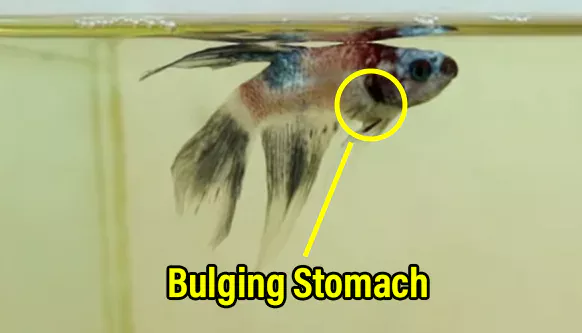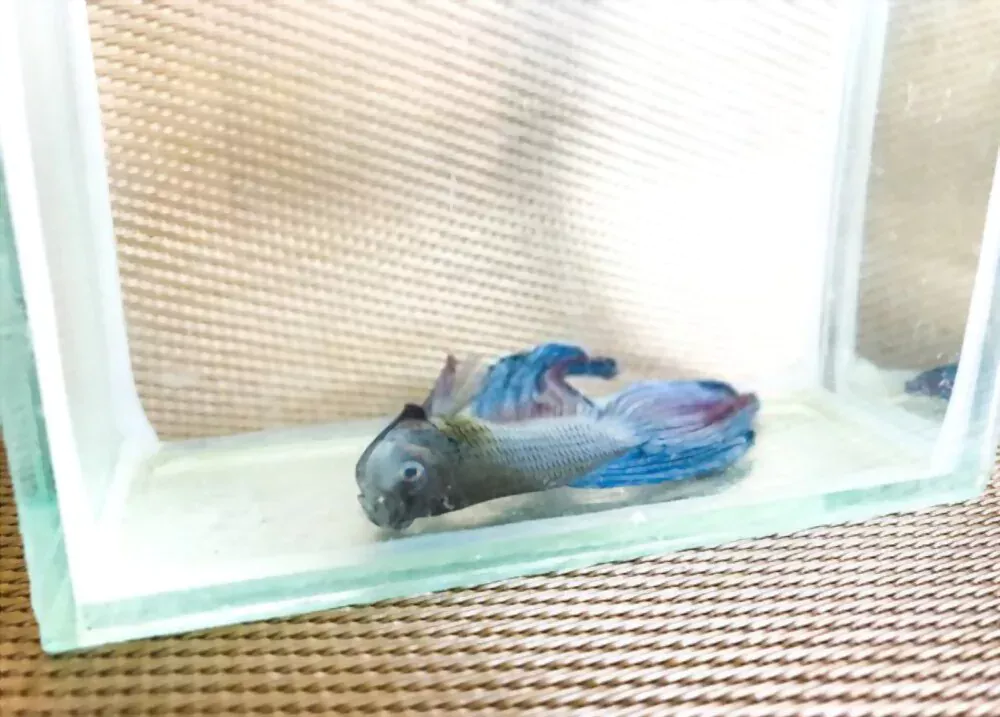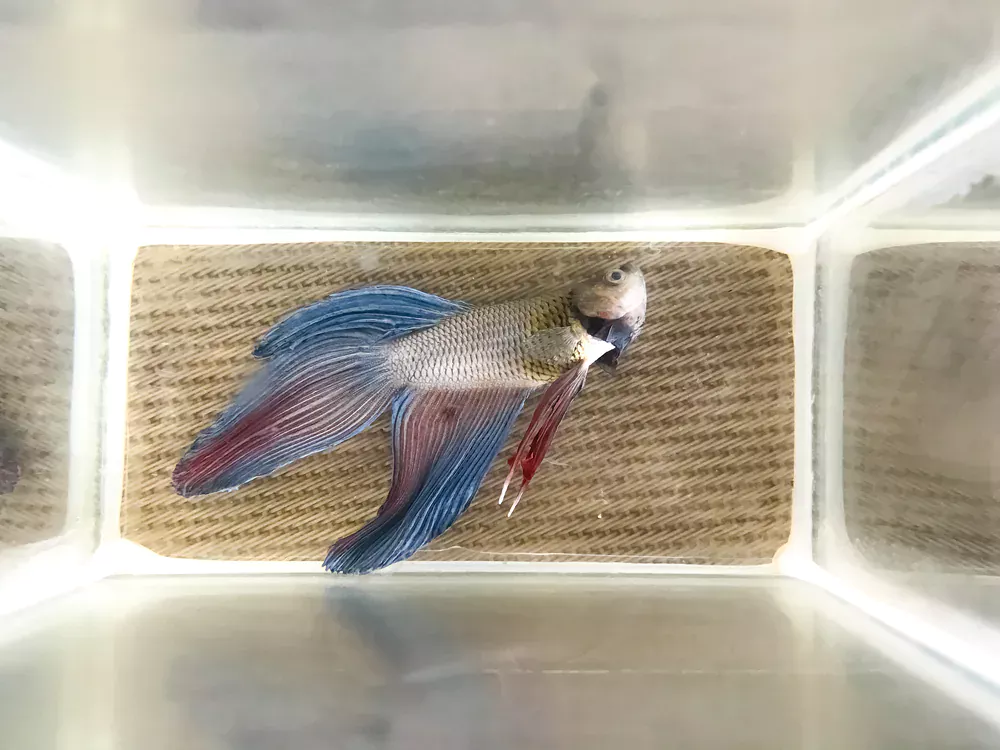So you have your betta fish overfed? I mean, you literally just dumped a handful of food into his little bowl just because it looked like he wasn’t eating too much and then he’s suddenly swimming around like he won the Olympics.
It’s sad. I have faced a similar problem as well and I know the feeling. If you have made the same mistake, just continue reading and it will help your fish poop out all that extra food.
Let’s start with the most basic question:
Can Betta Fish Be Overfed?
Yes, it is possible that you will find yourself in a situation where you have your betta fish overfed. Overfeeding can lead to obesity, which is fatal for a betta fish.
Bettas are carnivorous tropical fish that require a high protein diet to thrive and develop properly. The best way to feed your betta is by using live or frozen food, such as brine shrimp or blood worms. It’s also important to note that you should only feed your betta once a day at most.
If you’re using frozen or live food, then you should use tweezers or chopsticks to place the food into the water slowly so that it doesn’t sink too quickly. You can also use a feeding stick with holes at the end of it so that your betta can easily eat from it without getting stuck in one spot.
However, If you have no other option than to feed your betta by hand, it is important that you carefully measure the amount of food needed for each meal. Be sure to take into consideration the size of the fish, as well as its activity level, when determining how many pellets or flakes you can give at one time.
On the other hand, if you’re using dry pellets then these should be dusted with vitamins before putting them into the tank because they don’t contain any nutritional value whatsoever and are just used as a supplement for those who want their fish to grow faster than normal.
You can buy some live food from your local pet store. But if your local pet store doesn’t store live food then online stores are a good alternative because they often offer free delivery options which means that it won’t cost much more than a packet of freeze-dried food would have done anyway (usually around $8-$12 per order).
9 Reasons Why Should Not Have Your Betta Fish Overfed
Here are 10 reasons why you should never overfeed your betta fish:
1- It makes them overweight and sluggish
2- It makes them more susceptible to parasites like ich or velvet
3- It can lead to obesity, which can cause organ failure
4- It can cause constipation, which will eventually lead to death if not treated properly
5- It can cause bloating and internal infections within the body of the betta fish
6- It can cause digestive problems such as diarrhea or constipation, which is also fatal for your pet fish if left untreated for too long
7- It increases the amount of time they spend at the surface of the water, which can lead to respiratory problems and infections in their gills (like fin rot)
8- If you have your betta fish overfed on an empty stomach, it could result in food poisoning and death after a few days of overfeeding or even sooner depending on the condition of your betta fish at the time
9- Overfeeding will stress out your betta fish as well as make it look bloated because they don’t have enough room in their stomachs to digest all of that extra food being given to them each day, especially if they were already full.
How Do I Know If I Have My Betta Fish Overfed?
If you are in doubt that you might have your betta fish overfed, then following are some of the symptoms that will help you determine whether you are overfeeding your betta fish or not:
1- Bulging Body

Another symptom of overfeeding your betta fish is bulging body parts such as its stomach or tail fin. A bloated stomach or bloated tail fin indicates that there are too many nutrients being consumed by your betta which may cause digestive issues and other health complications such as swim bladder disease or constipation if not treated immediately
2- Lethargy Or Sluggish Behavior
A lethargic or sluggish behavior is a symptom of overfeeding because it means that your betta fish has become overweight and may have some health issues such as digestive problems and constipation (which can lead to bloating).
3- Cloudy Eyes
A betta fish with cloudy eyes is a symptom of overfeeding. The cloudy appearance of the eyes is due to an increased level of mucus in the eye chamber. This mucus is produced by the body to protect the eye from infections and injury. When there is too much food intake, it causes an increase in mucus production which can lead to cloudiness in the eye chamber.
4- Red Gills
Bettas have a red gill cover that covers their gills when they are resting or sleeping on their side or bottom of the tank or bowl (see image below). If you see that your betta’s gill cover is red or pink instead of its normal dark blue color, then it could be a sign that he has been overfed with too much food.
5- Increased Gill Movement
If some how you have your betta fish overfed, it will have to work harder to process all that excess food in its digestive system. This could cause an increase in gill movement which may lead to respiratory problems for your betta fish if not treated immediately.
Can A Betta Fish Die From Being Overfed?

Yes, overfeeding your betta fish can cause bloating and even death if not corrected. This is a common problem and the number one way to kill your betta. It’s tempting to feed more than the recommended amount, especially if you can’t see your fish eat all of it. However, overfeeding can lead to serious health problems and even death in your betta.
If you have a lot of fry in your aquarium, they may also be able to eat more food than an adult betta.
Let me tell you something interesting, Betta fish are able to eat up to 1% of their body weight each day, which means they can eat as much as 1 gram per day (approximately). This is why it’s important to only feed them enough food so that they don’t waste any and still have room left over for them to eat later on in the day.
If you give them too much food at once, then they will likely not be able to finish it all before it goes bad or gets eaten by other fish in the tank. This can lead to an increase in ammonia levels within your aquarium because the uneaten food will rot and release ammonia into the water column. Which can also lead to other health issues.
How To Help Overfed Betta Fish?
Overfeeding your betta can be easily remedied. Here are some simple steps you can take to get your overfed betta fish back on track.
1- Stop Feeding Them For 24 Hours
The first thing you need to do is stop feeding your fish right away for 24 hours. This will give his digestive system time to rest and recover from all the extra food he’s been eating.
2- Reduce The Food Intake
After 24 hours reduce the amount of food you give your betta daily by half or more. If you feed him twice a day, cut it down to once per day. Your fish will still eat the same amount of food in total, but he will be less likely to overeat and develop swim bladder problems if he eats less often.
3- Remove Uneaten Food From The Tank
Make sure there are no uneaten pellets under the fish tank or in the tank substrate. If there are uneaten pellets left behind after feeding time, remove them so they do not rot and cause harmful ammonia spikes in the tank water that could harm your betta’s gills and fins as well as irritate his skin and eyes.
4- Perform Regular Water Change
One more thing you need to do is perform a 25% water change on your tank every day until the excess fat has disappeared from your betta’s body and he looks normal again (this should take about 5 days).
5- Keep An Eye On Your Fish’s Behavior
You should also keep a close eye on your fish’s behavior and appearance over the next couple of days, as this will give you an indication of whether or not he will be able to recover fully from his ordeal. If he seems happy and healthy, then there’s nothing more that needs to be done besides offering him smaller portions of food in the future. But if he appears lethargic or unwell in any way, then it might be best to take him to an aquarium professional or vet for treatment.
Final Thoughts
Now that you know what to do if your betta has been overfed, go out and do it! These are very simple steps but they can help to ensure your betta lives a long, happy life. Just remember that proper care of your betta is important for its well-being, and providing too much will only hinder its life.
Remember that overfeeding is only one factor in the overall health picture, so be sure to research proper husbandry for your little pet. Thank you for reading and have fun with your new fishy!

